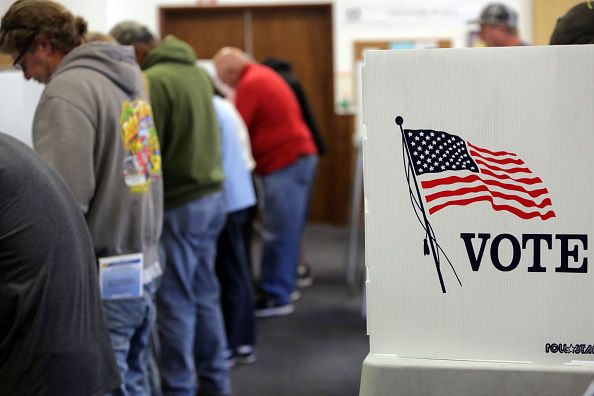
For over three years Donald Trump has refused to release his highly-coveted tax returns, citing reasons that include being audited or choosing to withhold them until Hillary Clinton releases her emails. But now nearly 20 states, sick of the excuses, have considered legislation to keep his name off the ballot until he does.
This week, the California Senate voted 27-10 on a measure that would require anyone appearing on the state's presidential primary ballot to make five years' worth of income tax returns available to the public. If the bill becomes law, Trump would need to file his tax returns with the state before March 3, 2020.
The legislation will now go to Governor Gavin Newsom's desk, a newly-elected Democrat who has positioned himself as a "resistance" leader to Trump and his administration. While Newsom has released his own tax returns, he hasn't indicated whether he will sign the bill or veto it.
According to the National Conference of State Legislatures, 18 states have considered proposals so far this year that would force all presidential and vice presidential candidates to release their tax returns before appearing on the ballot during a primary or general election.
"I'm in favor of the idea in terms of sending the message that [Trump] ought to release his tax returns," Richard Painter, the chief ethics lawyer under President George W. Bush, told Newsweek. "But there is a significant risk that they could lose to him in court on that."
If such a law prohibiting ballot access was passed by a state, the president and his attorneys would likely immediately challenge that the act is unconstitutional—which, on one level, is true.
The Constitution specifically outlines certain requirements needed to run for president, like having to be a natural born citizen and at least 35 years of age or older. But there is no language demanding the disclosure of a candidate's financial information.
If states can require a candidate to release their tax returns, they could make other changes as well. What if a state decided that 35 is too young to be president and they want to raise the minimum age to 40? What if a state wanted to impose a one-term limit on all presidential candidates or mandate that all candidates at the federal level (including members of Congress) be natural born citizens.
"The constitutional argument that Trump's people would make would be: 'Well where do you draw the line?'" Painter said, adding that the president will absolutely challenge any state laws requiring the release of tax returns in order to appear on the ballot.
"My biggest concern is that if he challenged it and he won … I'd hate to have the public get the impression that somehow the courts think it's okay that he doesn't disclose his taxes," Painter said.
But according to experts, the states also have a legitimate legal argument to support this kind of ballot measure. The Constitution does allow them to regulate the manner of elections. For instance, individual states can mandate how many signatures a candidate needs to get on the ballot.
"We don't think these laws, if put together appropriately and applying to everyone, would be illegal or unconstitutional," Noah Bookbinder, executive director at the Citizens for Responsibility and Ethics in Washington, told Newsweek.
Plus, the states could also argue that the measures are nothing more than a disclosure requirement to get onto the ballot. The law does not outrightly disqualify anyone, because everyone should have the ability to release their tax information.
"It's not that you can't be rich," Painter said. "It's not a qualification for office. It just requires candidates disclose certain information. And states should be free to require candidates disclose certain information like taxes."
Every single president since Ronald Reagan has made their tax returns available to the public, that is except Trump.
Tax returns provide information about a candidate's potential conflicts of interests, their income, charitable giving and other details that can be useful for people to have in evaluating how to cast their vote.
But Trump and members of his administration have argued that the American public simply doesn't care about his tax information, even though nearly every survey done on the issue shows that is not the case. Sixty-four percent of voters think the president should publicly release his tax returns, while 29 percent believe he should not, according to a Quinnipiac University poll in March.
While none of the states considering such ballot measures have successfully signed them into law, the president's allies have already slammed such regulations as biased attacks against Trump.
Democrats in the 2020 race have also faced calls to release their tax returns. So far, at least nine of the 21 candidates have complied. Of the 2020 candidates to release the information, at least three are millionaires: Bernie Sanders, Elizabeth Warren and Kamala Harris.
"I don't think this is something that should be done as a weapon against a particular candidate. This is a thing that should apply to everybody" Bookbinder said. He added that even if a federal court ruled against a state law, it wouldn't necessarily set us back any more than President Trump already has when it comes to expectations of transparency.
"Doing nothing already sets you on the track of eroding those kinds of democratic norms," Bookbinder said. "I do think trying to find ways to require what had previously been an agreed upon tradition makes some sense."
Uncommon Knowledge
Newsweek is committed to challenging conventional wisdom and finding connections in the search for common ground.
Newsweek is committed to challenging conventional wisdom and finding connections in the search for common ground.
About the writer
Alexandra Hutzler is currently a staff writer on Newsweek's politics team. Prior to joining Newsweek in summer 2018, she was ... Read more
To read how Newsweek uses AI as a newsroom tool, Click here.








